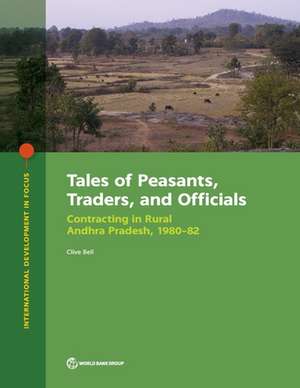Tales of Peasants, Traders, and Officials
Autor Clive Bellen Limba Engleză Paperback – 26 iun 2020
Understanding what motivates agents to contract in a particular way--or not at all--is essential in such a study. At the beginning and toward the close of the survey work, the principal investigators conducted interviews with focus groups, some respondents in the household sample, and various public officials, who were encouraged to speak freely. The first part of the monograph comprises an introductory chapter and two long travelogues, which provide structured accounts of the proceedings of those interviews.
Next are formal analyses of various alternative contractual arrangements and the villagers' choices among them. These are partly inductive; they draw on what respondents had to say about their options and decisions as well as received theory. Four topics are treated in detail: (1) the choice between employment as a casual laborer and as an attached farm servant; (2) the choice between sharecropping and fixed-rents paid in kind, with special reference to land irrigated by percolation wells; (3) the closely related matter of loans, subsidies, and corruption in connection with the profitability of investments in wells; and (4) the tying of loans for the cultivation of commercial crops to the arrangements for marketing them. The central importance of villagers' outside options and access to credit emerges clearly.
Preț: 297.36 lei
Nou
Puncte Express: 446
Preț estimativ în valută:
56.92€ • 61.85$ • 47.84£
56.92€ • 61.85$ • 47.84£
Carte tipărită la comandă
Livrare economică 21 aprilie-05 mai
Preluare comenzi: 021 569.72.76
Specificații
ISBN-13: 9781464815553
ISBN-10: 1464815550
Pagini: 112
Dimensiuni: 216 x 279 x 9 mm
Greutate: 0.41 kg
Editura: World Bank Publications
ISBN-10: 1464815550
Pagini: 112
Dimensiuni: 216 x 279 x 9 mm
Greutate: 0.41 kg
Editura: World Bank Publications
Descriere
Provides an extensive descriptive account of villagers' dealings in the markets for labour, tenancies, credit, and crops, drawing on interviews and household surveys from the early 1980s. The book then analyses various alternative contractual arrangements and villagers' choices among them.
